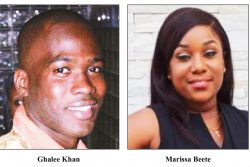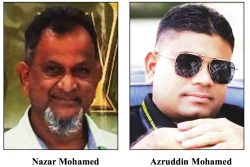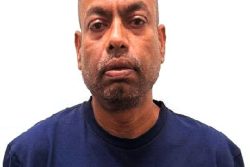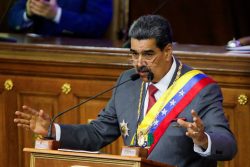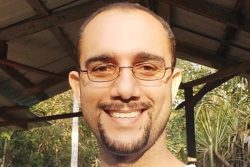Long conceptual and practical experience has taught me that the vicissitudes of the negotiation process are such that what at first may appear simple can become very complex, requiring an inordinate amount of thought and preparation. I promised to argue this week ‘that Mr. Bharrat Jagdeo is in a harder place, but that he would have made it much more difficult for the PNC to reject his list had he adopted something of Desmond Hoyte’s approach and given Mr. Granger the choice of one or two acceptable Africans.’ Since then, two other dimensions that further complicate matters have arisen in the controversy over the appointment of the chairperson of the Guyana Elections Commission.
Regardless of its intentions, the APNU+AFC government botched its reaction to the first list sent to it by the Leader of  the Opposition when it sought to question long-standing constitutional interpretation and practice. It left the PPP with a level of ‘belief’ that is as close as one can get to ‘knowledge’ that the government intends to revert to the old PNC trick of manipulating the elections by, among other things, directly controlling the elections machinery. If there is any doubt about this, just listen to former president Donald Ramotar voicing what has now become a PPP mantra. ‘For us to achieve … peace and prosperity, we must have all political parties committing to multi-racial, multi-ethnic policies. At the foundation of this is free and fair elections. What is the real purpose of a Ministry of Citizenship? Why is the President refusing to choose a person from the lists given to him after the Leader of the Opposition consulted widely with civil society?’
the Opposition when it sought to question long-standing constitutional interpretation and practice. It left the PPP with a level of ‘belief’ that is as close as one can get to ‘knowledge’ that the government intends to revert to the old PNC trick of manipulating the elections by, among other things, directly controlling the elections machinery. If there is any doubt about this, just listen to former president Donald Ramotar voicing what has now become a PPP mantra. ‘For us to achieve … peace and prosperity, we must have all political parties committing to multi-racial, multi-ethnic policies. At the foundation of this is free and fair elections. What is the real purpose of a Ministry of Citizenship? Why is the President refusing to choose a person from the lists given to him after the Leader of the Opposition consulted widely with civil society?’
It was customary for the PNC to simply take control of the election process, ballot boxes and all but in the liberalized post 1992 era, in which the Carter Formula was an important element, the PNC was forced to relinquish its more blatant interventions even if both parties continue to find covert ways to perform their questionable electoral designs.
In other words, although they are aware that the other would attempt to take questionable advantage of the process, the struggle for democracy has ‘progressed’ and intentions have gradually been evolving away from seeking to take direct control of the electoral institutions. Mr. Granger’s response to the lists Mr. Jagdeo has so far presented to him appears to have thrown this context into reverse and forced upon Mr. Jagdeo the need to seek a greater level of electoral rectitude than Jagan.
In this context, think also of the Opposition Leader’s contention that since it is near impossible to find Guyanese with ‘deep knowledge in electoral matters’ and/or who are apolitical, the president should agree to the changing the constitution to allow the list to contain other nationals. In politically normal ex-colonial type countries, such a suggestion would be taken as an affront, but for all sorts of reasons and from all manner of places, in ethnically divided societies it is not unusual to seek neutral referees. The current quarrel in the United Kingdom about the capacity of a British government to be neutral in putting the power-sharing agreement between the warring parties in Northern Ireland back on track when it is dependent on one side – the Democratic Unionist Party – to stay in government is a typical example.
Mr. Bharrat Jagdeo is also in another even more tricky position negotiators try to avoid at all costs, namely negotiating under duress! It must be almost impossible to be in charge of a government for 23 years and not take some action that is legally questionable. The hullaballoo over the law books and the former attorney general is a good example. The PPP’s leadership is dialoguing with a government that is investigating and promising each day to incarcerate them, and whose supporters believe that they have been so wronged by the PPP that they are salivating at such a prospect! There is a conflict of interest here having to do with what is best for PPP’s leadership, its membership and the nation.
Indeed, lest we forget how these issues can develop, some time ago I had occasion to state: ‘What is taking place in Fiji should alert Guyanese to pay greater attention to the natural structure of their political context. In Fiji, the political chaos that has resulted from its ethnic divide has allowed the military to exploit insecurities, suppress political expression across the board and promote itself as the dominant universalizing factor’ (SN: 29/10/2014). To accomplish this task, Rear Admiral (Ret) Frank Bainimarama and his Fiji First party have, among other things, dissolved the Great Council of Chiefs, the traditional high decision-making body of the indigenous people, and the popular Indian leader of the Labour Party, Mahendra Chaudhry, was found guilty of tax evasion and disqualified from participating in the elections. The coast having been left clear, Fiji First ‘won’ the 2014 elections, which Bainimarama claimed put an end to ethnic voting but one commentator assessed as: ‘a permanent state of coup which will indeed preclude future coups’ (SN:22/10/2014).
If for no other reason than that they have taken upon themselves constitutional responsibilities that makes their precarious position almost unavoidable, the PPP’s leadership will either deny that this conflict of interest exists and/or that it is likely to affect their decision making! Be that as it may, although Mr. Jagdeo’s proposal of a list with foreigners was rejected by the president, he tentatively accepted the government’s suggestion ’that a high-level committee be put together to explore options if no one is found from Jagdeo’s third list’ on three conditions. Whatever is agreed by the committee must be constitutional, must satisfy both the PPP and APNU and must not violate the balance of the Carter Center Formula, which gives the government and the opposition three commissioners each with a chairperson to be selected through a collaborative approach.
As I understand it, this new format would ultimately transform the process from a silent negotiation, which offered the opposition some benefits, into a face-to-face one with possible advantages for the government! The process removes from the opposition the capacity to manipulate the list to its advantage in the fashion done by Hoyte and Jagan as explained in last week’s column. Furthermore, a face-to-face negotiation will be more open and the media can be depended upon to find ways to keep the public informed about agreements, disagreements and heaven forbid, a deadlock. If he finally accepts this approach would Mr. Jagdeo be locking himself into an inextricable situation?
I have argued many times that Guyana does not have an effective public political opinion but the PPP now finds itself facing a double whammy: not surprisingly coming from government supporters but after what it has fed them about the undemocratic intentions of the APNU+AFC, emanating from its own constituency who now expect a robust response. Mr. Jagdeo will do well to more seriously consider his own context and the framework and content of the third list he intends to present to the President.



